Chapter 2: Aunt Marge's Big Mistake
| Simplified Chinese (Mandarin: China) | ||
| 玛姬姑妈的大错误 Mǎjī gūmā de dà-cuò-wù |
玛姬
Mǎjī = 'Marge'. 姑妈 gūmā = 'father's (married) sister' = 'aunt'. 的 de = connecting particle (possessive) 大 dà = 'big, large'. 错误 cuòwù = 'mistake, blunder'. |
Aunt Marge's Big Mistake |
| Traditional Chinese (Mandarin: Taiwan) | ||
| 瑪姬姑姑犯大錯 Mǎjī gūgū fàn dà-cuò |
瑪姬
Mǎjī = 'Marge'. 姑姑 gūgū = 'father's sister' = 'aunt'. 犯 fàn = 'commit'. 大錯 dà-cuò = 'big mistake'. |
Aunt Marge Makes a Big Mistake |
| Japanese | ||
| マージおばさんの大失敗 Māji oba-san no dai-shippai |
マージ
Māji = 'Marge'. おばさん oba-san = 'aunt'. の no = connecting particle (possessive) 大 dai- = 'big, large'. 失敗 shippai = 'big mistake, big blunder'. |
Aunt Marge's Big Blunder |
| Korean | ||
| 마지 아줌마의 큰 실수 Maji ajumma-ui keun silsu |
마지 Maji = 'Marge'. 아줌마 ajumma = 'middle aged woman, aunty'. 의 -ui = connecting particle (possessive). 큰 keun = 'big, large'. 실수 (失手) silsu = 'mistake, blunder'. |
Aunt Marge's Big Mistake |
| Vietnamese (Chinese characters show etymology) | ||
| Sai lầm lớn của dì Marge | sai lầm = 'mistake, blunder'. lớn = 'big, large'. của = 'of' dì = 'aunt' (strictly means mother's younger sister). Marge (pronunciation footnote: Mạc). |
Aunt Marge's Big Mistake |
| Mongolian (new) | ||
| Нагац эгч Маржийн том алдаа Nagats egch Marjiin tom aldaa |
нагац эгч nagats egch = 'aunt (mother's sister)'. Марж Marj = 'Marge' (-ийн -iin Genitive form). том tom = 'big, large'. алдаа aldaa = 'mistake'. |
Aunt Marge's Big Mistake |
Aunt Marge's mistake was to continually insult Harry and his parents, resulting in a nice comeuppance.
How is 'aunt' translated?
In English, an aunt can be either a blood relative or a relative through marriage:
- Blood relative: the sister (either older or younger) of EGO's father or mother or
- Relative through marriage: the wife of the brother (either older or younger) of EGO's father or mother.
J. K. Rowling has written that:
- Marjorie Eileen Dursley is the older sister of Vernon Dursley. Although no blood relation of Harry Potter, he has been taught to call her "Aunt Marge".
This informs us that Aunt Marge is so called from Dudley Dursley's point of view. If we put Dudley's aunts into a simple diagram (Dudley marked as EGO):

Marge is Dudley's aunt on his father's side. Harry's mother, Lily Potter, who died around the time of his birth, was Dudley's aunt on his mother's side, although the Dursleys would no doubt have done their best not to call attention to this.
From Harry's point of view (i.e., Harry as EGO), Petunia is his aunt, Vernon is his uncle by marriage, and Dudley is his cousin. But Marge is not Harry's aunt.
Presumably the Dursleys make Harry call her 'aunt' because he is roughly equivalent in status to Dudley, a kind of 'quasi-son', although an unwanted one. Since Dudley calls her Aunt Marge, Harry should too.
'Aunt Marge' in translation
Below we'll look at what Aunt Marge should be called in different languages from Dudley's point of view, taking into account differences in kinship terminology.
For most languages in East Asia, the English word 'aunt' doesn't give sufficient information to indicate her relationship to Dudley. Two extra pieces of information are often needed:
- Whether Marge is on the father's or mother's side of his family
- Whether Marge is older or younger than Dudley's father or mother
Rowling's clarification that (1) Marge is on Vernon's side of the family, and (2) she is older than Vernon allows us to determine the correct term to use for her. But most of the translators didn't have this information at the time and had to either guess or ask Rowling directly. This is the main (although not only) reason that 'aunt' has been mistranslated in some languages.
Chinese words for 'aunt' are not easy to summarise, partly because both formal terms and everyday terms exist, and partly because there is regional variation, even within Mandarin. (See Wiktionary for a rundown.) In general, the everyday Chinese terms for aunt are:
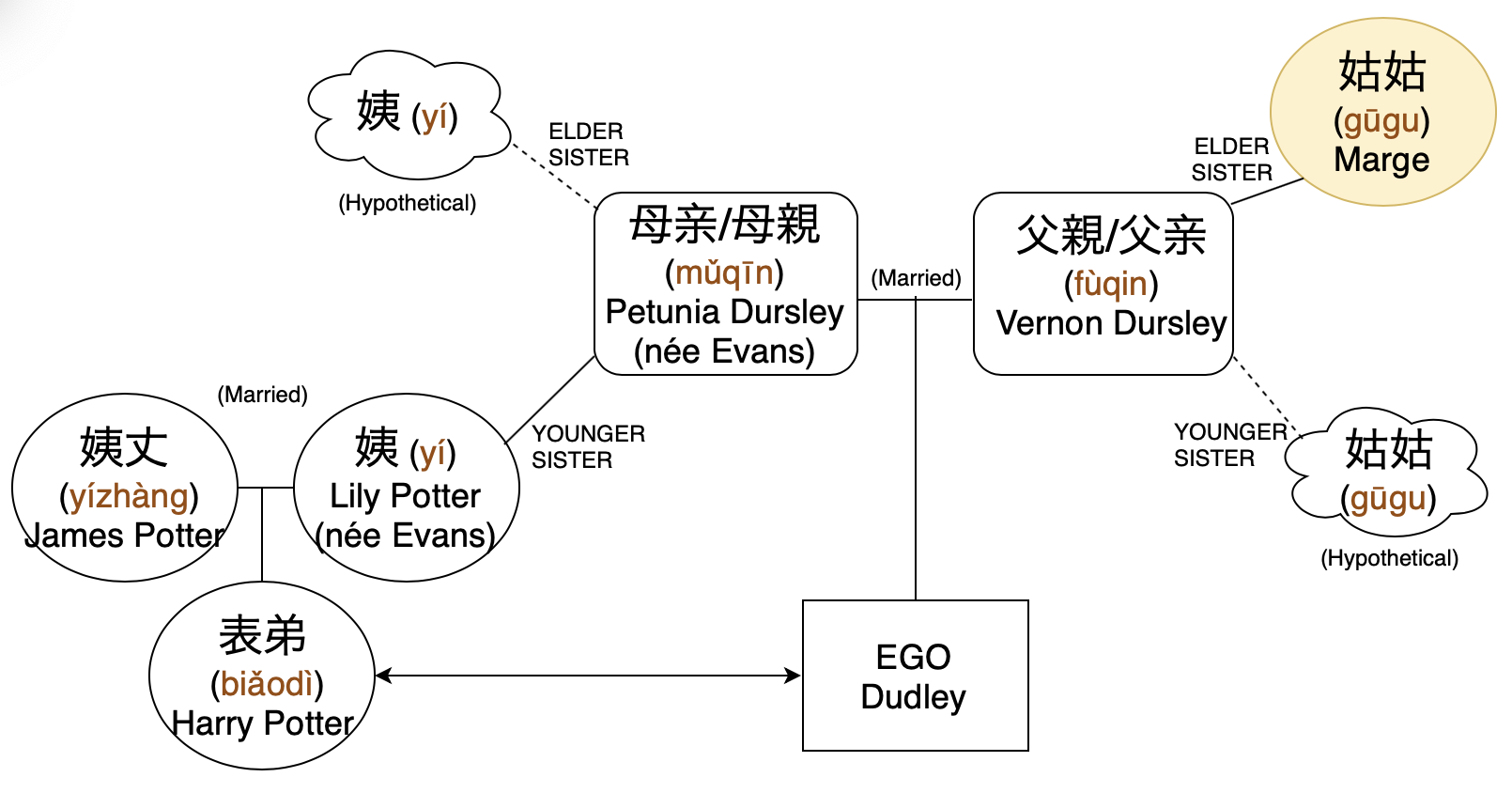
According to this chart, Aunt Marge is Dudley's 姑姑 gūgu (father's sister).
- The Mainland translation indeed uses 姑姑 gūgu, which is the most appropriate term for Aunt Marge with the widest applicability.
- The Taiwanese translation uses 姑媽 gūma (姑妈). While this is widely used, its meaning is not totally fixed. In some places it applies to Vernon's elder or younger sister. In many areas (including Beijing, which theoretically sets the standard) it applies to Vernon's elder sister only, which is appropriate in this case. But in other areas, it applies to Vernon's married sister, which is inappropriate because Aunt Marge was not married.
- The term that Dudley would have used for Lily Potter if she were alive is 姨媽 yíma (姨妈) or 阿姨 āyí. Another term applying to the youngest aunt would be 小姨 xiǎo-yí 'little aunt'.
Vietnamese kinship terms reflect both the side of the family and the age of the relative. Usage depends on the region.
In the north of Vietnam (esp Hanoi), the usual terms are:
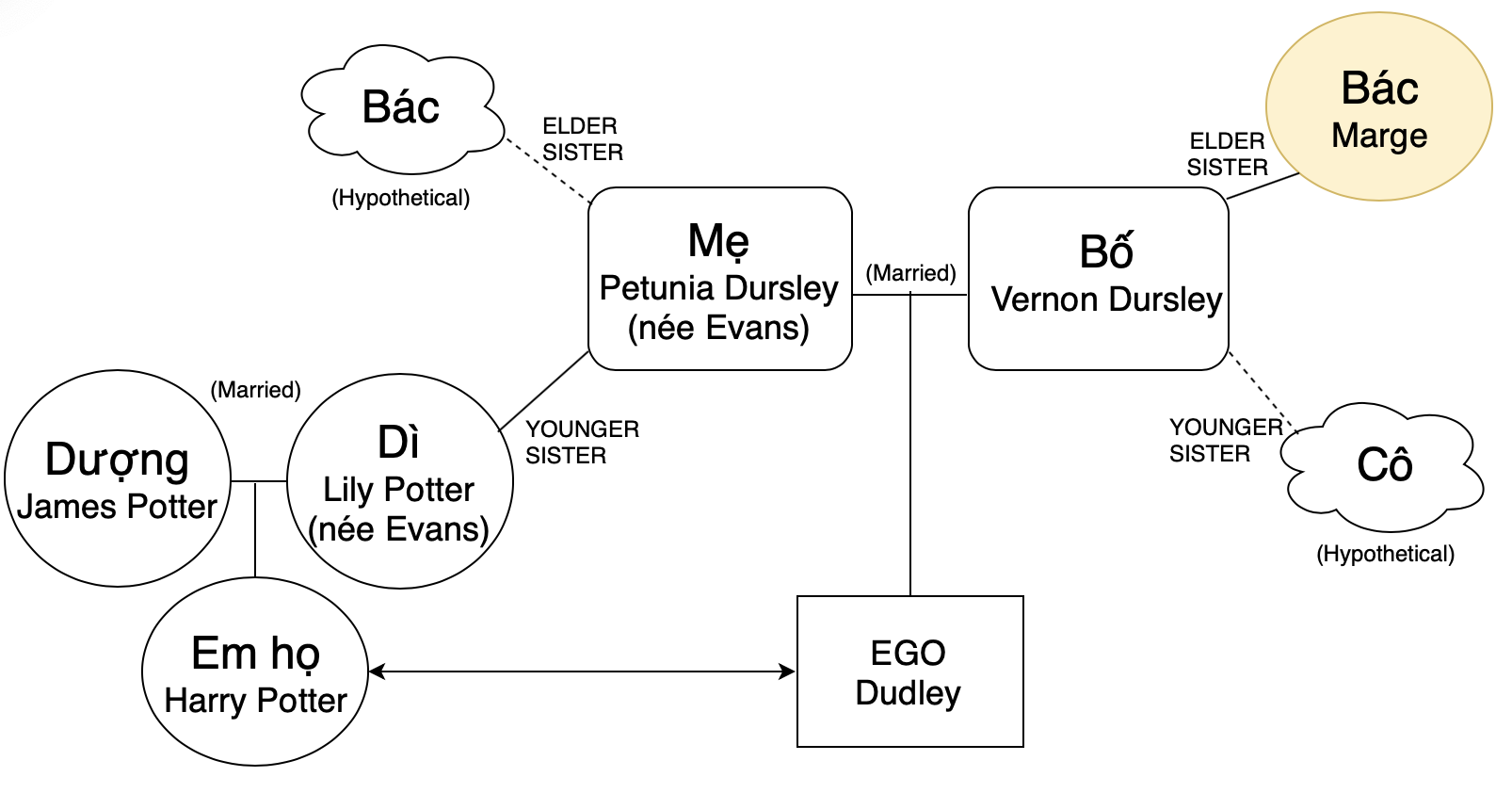
The correct term for aunt Marge is thus bác, which would refer to either Vernon's elder sister or Petunia's (hypothetical) elder sister.
In the south, where the translator is from, naming is slightly different:
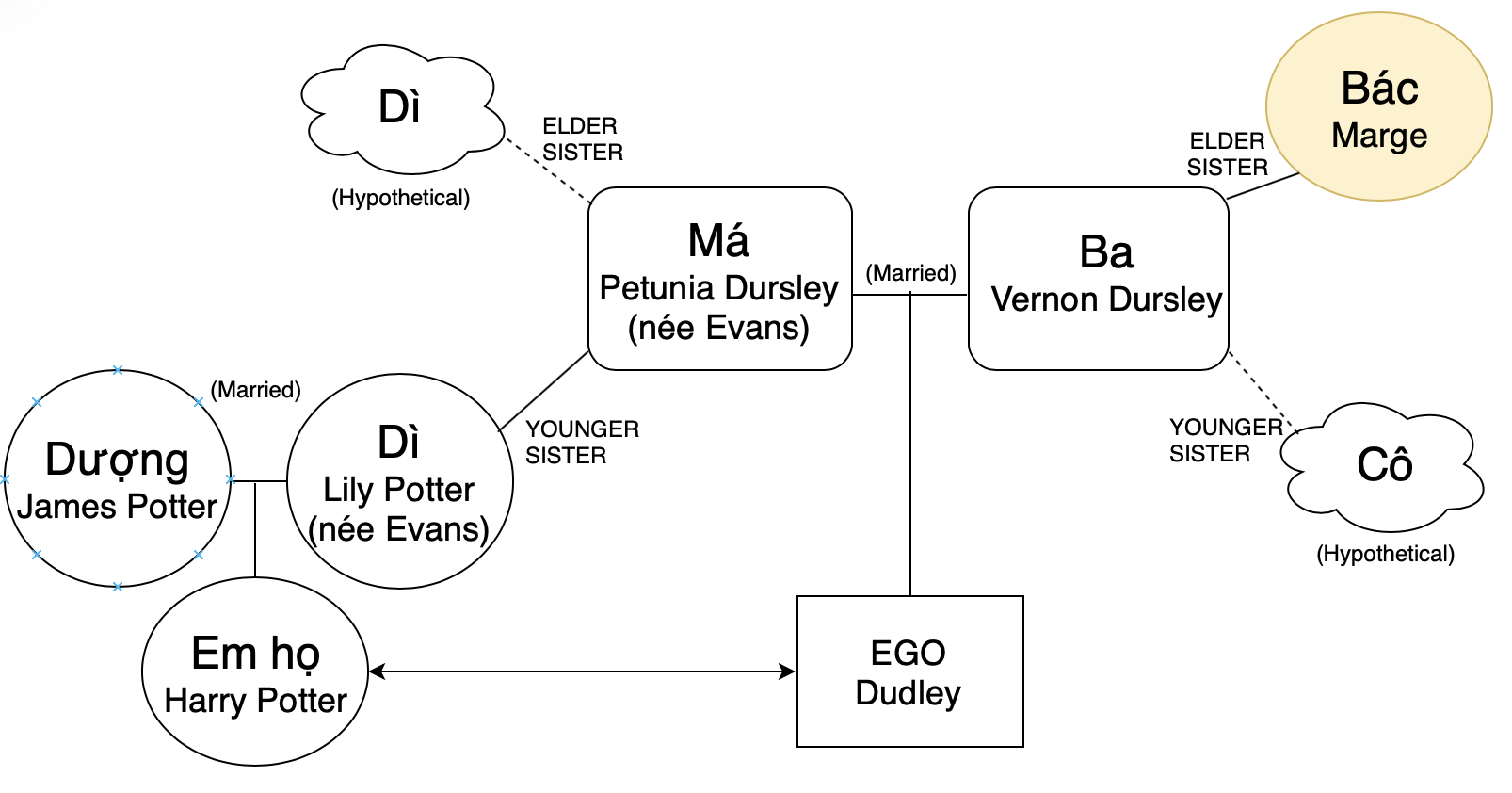
The correct term is again bác, since Marge is Vernon's elder sister. Dì would refer either to Petunia's younger sister (Harry's mother) or Petunia's elder sister (who does not exist.)
- Unfortunately, the usage of the Vietnamese translator is confused. In the chapter title she uses dì but in the text of the chapter she uses cô. The first would apply to Lily Potter, Harry's mother. Forcing Harry to use this term would be equivalent to mental cruelty. Cô would apply to Vernon's non-existent younger sister.
It is likely that the translator used dì and cô because she was completely unsure of the relationship involved.
On the Internet, bác Marge is commonly found on websites relating to Harry Potter, presumably because many fans have realised that this is the correct term.
Mongolian also draws a distinction between relatives on the father's side and the mother's side. The terminology is:
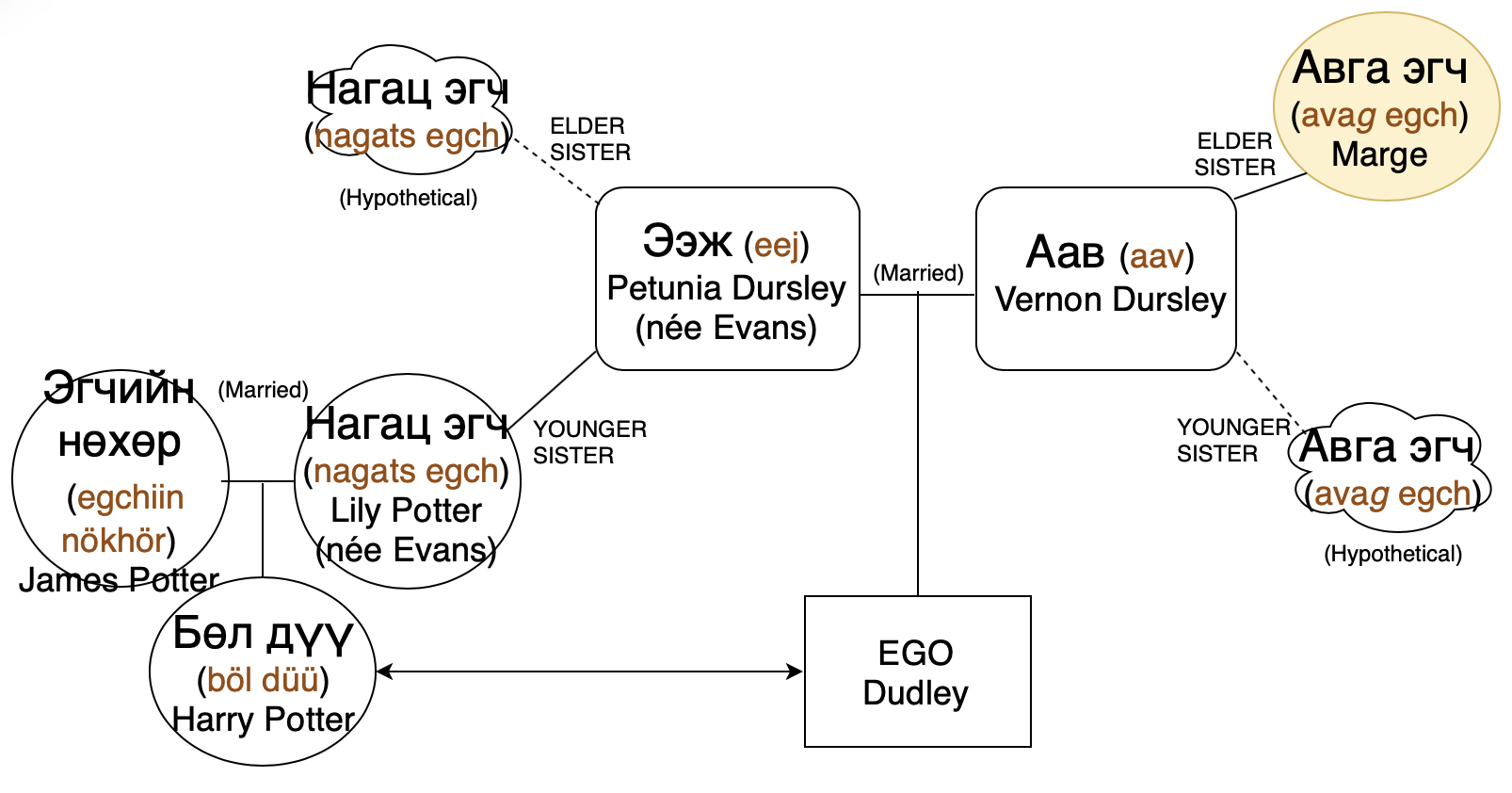
Unlike other languages here, эгч egch 'elder sister' does not mean that the aunt in question is the elder sister. Instead, it means that the aunt is older than EGO (Dudley). If Dudley had an aunt younger than himself, he would call her авга дүү avag düü (on his father's side) or нагац дүү nagats düü (on his mother's side). This would be the case if one of Dudley's grandmothers had a very late third daughter after Dudley himself was born, in which case his aunt would be younger than him.
The correct term for Aunt Marge is авга эгч avag egch for an aunt on his father's side.
- Unfortunately, the Mongolian translator uses the term нагац эгч nagats egch, referring to Dudley's aunt on his mother's side. Effectively, Vernon has Harry use the term that Dudley would have used for Harry's mother. This would be a very insensitive name to force poor Harry to use.
Since the translation was made after Rowling clarified Aunt Marge's status, this is a straightforward translation error.
Japanese resembles English in that there is no distinction in spoken Japanese among words for 'aunt' based on the side of the family or their age vis-à-vis father or mother.
Spoken Japanese:
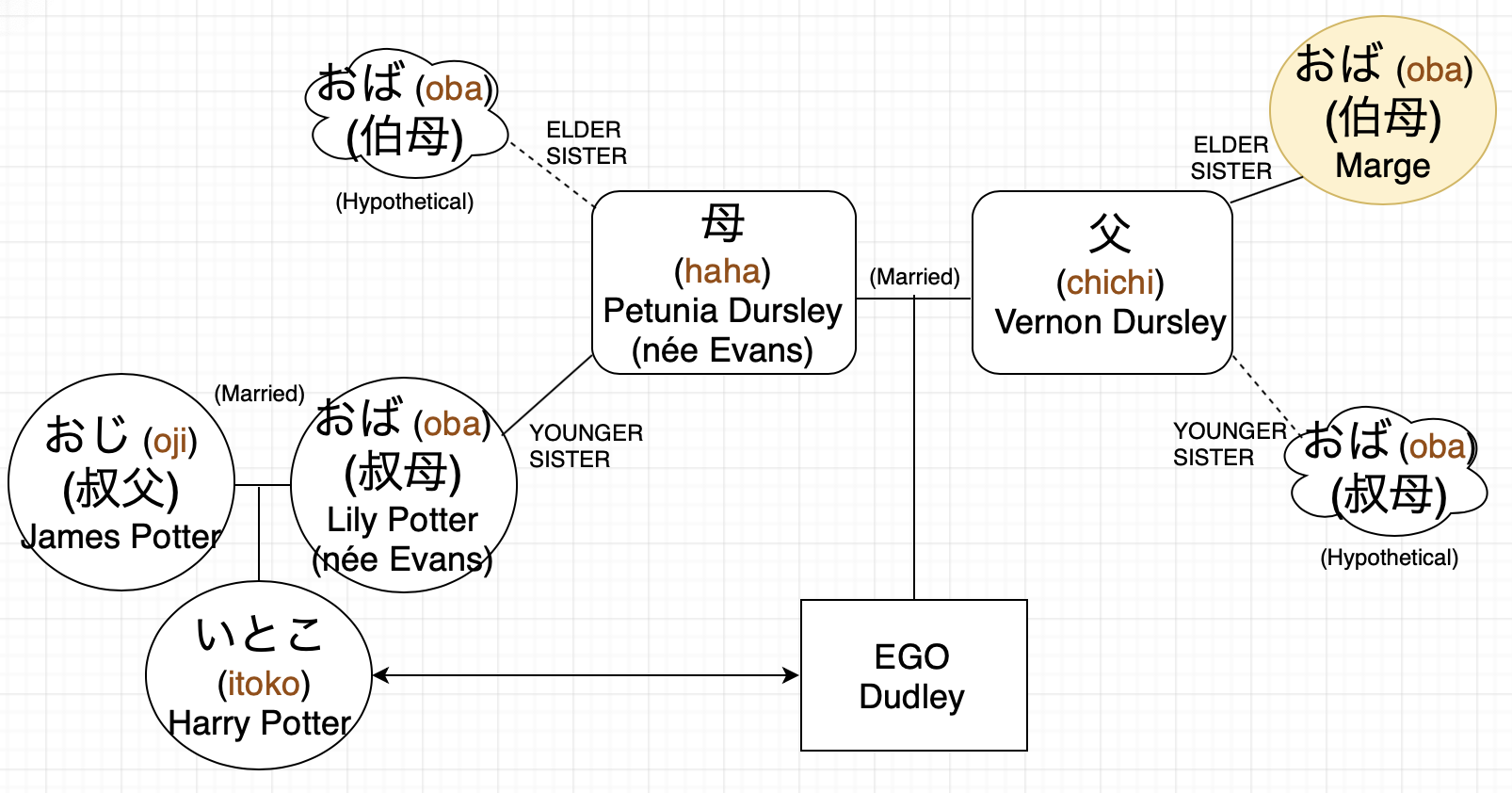
Japanese kinship terms are complicated by the fact that respectful terms are used within the family for older family members (using -さん -san) while humble terms are used when speaking about the family to outsiders. This is based on the concept of paying respect within the group but showing humility to the outside world.
The word for 'aunt' within the family is おばさん oba-san, and おば oba when speaking to outsiders. The name applies to both paternal and maternal aunts, as well the wives of all uncles. The correct word for Aunt Marge from Dudley's point of view is thus おばさん oba-san.
- おばさん oba-san is the term used by the translator, which is what Dudley would have called Aunt Marge. The translator writes this in hiragana.
The use of hiragana was most likely a deliberate choice. Had the translator used Chinese characters she would have had to clearly distinguish between younger and older aunts. That is because Japanese uses different Chinese characters depending on whether the aunt is older or younger than the parent:
- 伯母 oba for the elder sister of one's father or mother. This would be the correct way to describe Aunt Marge.
- 叔母 oba for the younger sister of one's father or mother. Aunt Lily (Harry's mother), was Dudley's 叔母 oba.
This is a classic case where Japanese has borrowed characters from Chinese to make differentiations that do not actually exist in spoken Japanese.
Unlike Japanese, Korean makes a firm division between aunts on the father's and mother's side:
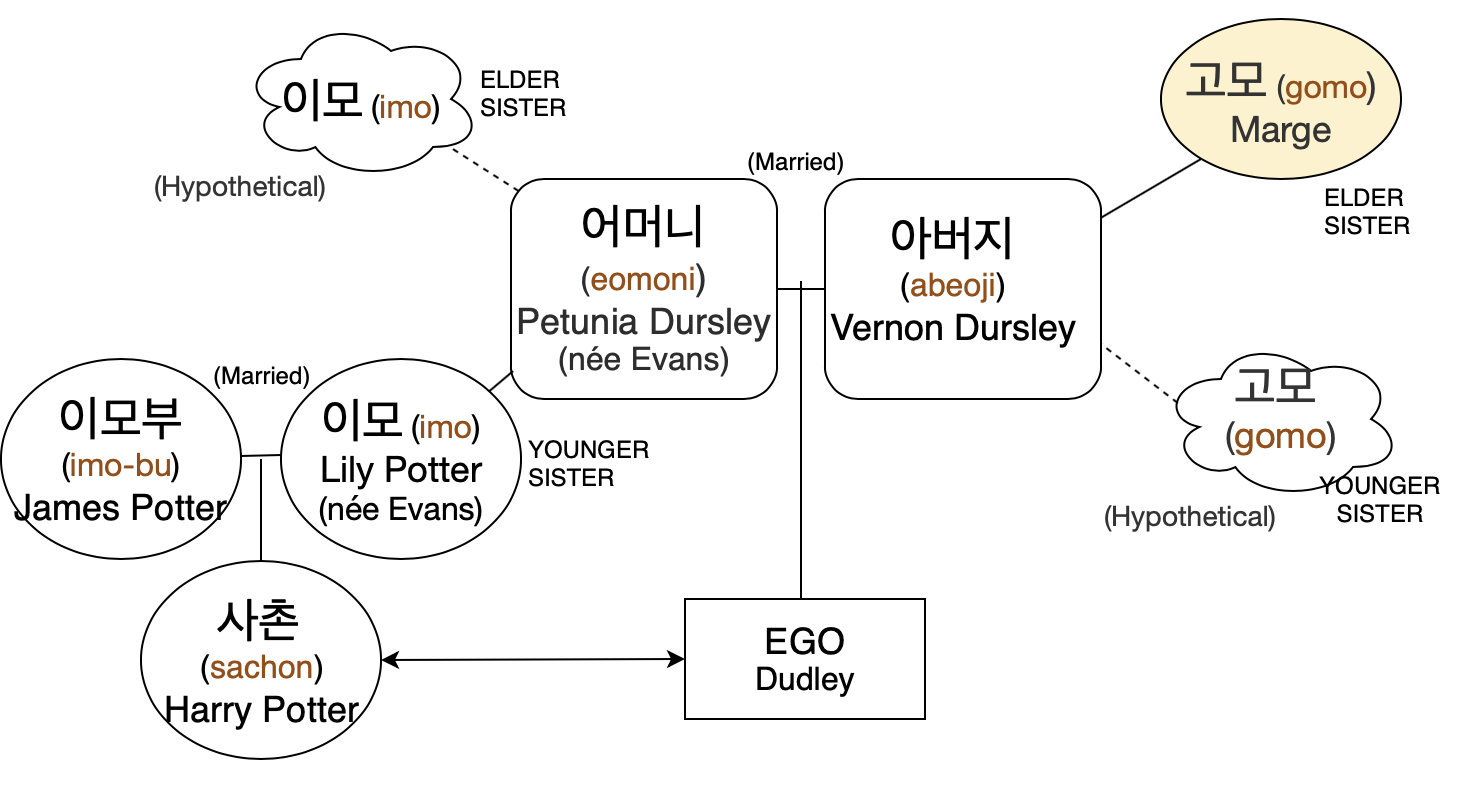
Aunt Marge is Dudley's 고모 gomo 'father's sister'. Lily Potter was Dudley's 이모 imo 'mother's sister'.
- However, the Korean translator does not use a proper kinship term for Aunt Marge. Instead she uses 아줌마 ajumma. This is related to 아주머니 ajumeoni, a very general term for women in an extended family who are close to EGO's father's age. In fact, 아줌마 ajumma is mostly not used for family members at all; it is a general term for women of roughly of an aunt's age (going on for middle age). By using this word, the Korean translator sidesteps the issue that Rowling raises, that Harry is forced to address Marge as 'aunt' even though she is not his actual aunt. In the Korean translation, Aunt Marge is just another lady.
Note: Where there is more than one aunt, Korean calls the older aunt 큰 고모 keun gomo 'big aunt (father's side)' or 큰 이모 keun imo 'big aunt (mother's side). The younger aunt is 작은 고모 jag-eun gomo ('little aunt (father's side)' or 작은 이모 jag-eun imo 'little aunt (mother's side)'. If there are more than two aunts, further aunts are numbered (e.g., 둘째 고모 duljjae gomo 'second aunt (father's side)', 셋째 고모 sesjjae gomo 'third aunt (father's side)'.
It is common in Asian languages to use quasi-kinship terms for women outside the family. As we saw, in Korean 아줌마 ajumma is derived from a kinship term but is mostly used as a general term for women of roughly of an aunt's age. Japanese children use おばさん oba-san to refer to women of an age around that of an aunt, as well as お姉さん o-nē-san 'elder sister' for young women. Chinese children use 阿姨 āyí 'aunt' for a youngish woman while even adults use 姐 jiě 'elder sister' for women older than themselves. Mongolians use эгч egch 'elder sister' for women older than themselves. Vietnamese use chị 'elder sister' and bác 'aunt' for women who are not family members. Similarly, words for 'grandmother' are used for elderly women in all these languages.
How is 'Marge' transliterated?
Most translations suggest that 'Marge' should be pronounced without an 'r' (that is, according to the pronunciation generally current in Britain). This is normal in Japanese and Vietnamese and generally the case in Chinese.
The Mongolian translation reproduces the 'r' according to ordinary practice in that language.
How is 'big mistake' translated?
Most translations (Chinese, Vietnamese, Mongolian, Korean) simply use words meaning 'mistake'.
- The Mainland Chinese translation uses 錯誤 (Trad.) / 错误 (Simpl.) cuòwù, the general Chinese term for a mistake. It is modified by the adjective 大 dà 'big'. (Note: the connector 的 de is not required because 大 dà is a single syllable adjective.)
- The Japanese translator uses the word 失敗 shippai, which means 'failure' or 'blunder'. This
word is frequently used for even relatively small errors in judgement.
(While the Japanese is based on Chinese, the Chinese word 失敗 (Trad.) / 失败 (Simpl.) shībài means 'defeat' or 'failure' - see Chapter 9 ('Grim Defeat') below. This is a case of a 'false friend' - a word that looks like it should have the same meaning but doesn't.) 'Big' is translated as 大 dai- 'big'. This is not an adjective in Japanese. Instead it is a kind of prefix that forms compound words with nouns, e.g., 大恋愛 dai-ren'ai 'great love (affair)'.
- The Korean term for a mistake is 실수 silsu, written 失手 in Chinese characters, literally 'lose hand'. In Chinese this has the narrow meaning of a slip of the hand, for example 'dropping something' (and perhaps breaking it) or killing someone by mistake. In Korean the meaning has been generalised to that of a blunder or mistake.
- Mongolian uses the word алдаа aldaa, related to the verb алдах aldakh 'lose, drop, blunder'.
The Chinese (Taiwan) translation inserts 犯 fàn 'commit' to make this into a sentence, 'Aunt Marge makes a big mistake'.
(Korean appears thanks to "Hiro".)
(Detailed notes on the chapter can be found at Harry Potter Lexicon)
| ⇚ Chapter 1 |
